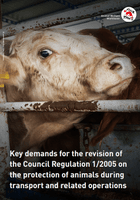
It is time for an EU ban on long distance live animal transport and live export to third countries
FOUR PAWS welcomes Germany's signal towards Europe
On the 28th of October, the German Federal Ministry of Food and Agriculture (BMEL) announced in a press release that German veterinary certificates for exports of live cattle, sheep and goats for breeding to third countries will be withdrawn with effect from 1 July 2023. Previously, corresponding veterinary certificates for all fattening and slaughter animals from Germany to third countries had already been withdrawn.
Theoretically, this would significantly restrict animal transports from Germany to countries outside the EU. In practice however, if the EU does not alter its rules on the trade of live animals alongside, Germany’s national restrictions might be circumvented due to loopholes within EU legislation. Furthermore, the withdrawal of veterinary certificates is not equivalent to an export ban. It acts rather as a bureaucratic burden for exporters, for whom the task becomes harder but not impossible as they can still deal with the foreign government to prove that standards demanded by the third country are respected. Therefore, if a third country is interested in live animals or animal products, a veterinary certificate agreed between the BMEL and the third country is not mandatory.
FOUR PAWS welcomes Germany’s signal towards Europe, triggering important discussions, but there is a need for more consequential measures. Whilst the EU Animal Welfare Transport Regulation (EC 1/2005) was intended to regulate the conditions under which animals may be transported, it does not sufficiently protect animals as journeys can last days or even weeks and journey times are allowed to last as long as 29 hours at a stretch, with little supervision over mandatory resting times. Until the European Commission publishes its well-anticipated revised animal welfare legislation in 2023, Regulation EC 1/2005 remains insufficient and inadequate.
Furthermore, the main problem lies with the fact that while all EU Member States must comply with EU animal welfare standards, third countries have only their own obligation to follow their national standards. In most third countries there are no legal standards for animal welfare and numerous documentations of NGOs and journalists have proven that animal cruelty happens not only during transport but also during the slaughter of the animals which takes place sooner or later to all exported animals and their offspring. Thus, as long as the export of live animals to third countries is permitted, it is practically impossible to ensure any acceptable standard of wellbeing. Nor is it possible to control or sanction cruelty to animals outside the EU. This is particularly sensitive as there is a ruling by the European Court of Justice that states that the standards laid down in the EU Transport Regulation 1/2005 must be respected until the final destination is reached, even if this is in a third country. Due to the lack of control possibilities, live exports to third countries most often do not comply with this ruling.
There is enough evidence of the negative effects of long transport times on the physical and mental wellbeing of animals, also presented during the Committee of Inquiry on Animal Transport (ANIT), to conclude that long distance live animal transports and third country live exports cannot ensure animal welfare. Numerous studies agree that journey times for all animals should not take longer than 8 hours and current EU transport regulation already highlights that long-distance transport is more likely to have adverse effects on animal welfare than short-distance transport.
More recently, research is showing that there are serious spillover effects on human health as well. In October 2022, the European Food Safety Authority (EFSA) published a scientific opinion assessing the risk of spread of antimicrobial resistance (AMR) among poultry, pigs and cattle during transport between or to slaughterhouses. The report shows that long transport times allow for greater bacterial multiplication and transmission of bacteria between animals. Therefore, if the EU is to abide by its commitment to improve animal welfare and One Health, it must ban long distance live animal transport and live export to third countries.
In light of this, FOUR PAWS has met with MEP Tilly Metz, President of the Intergroup on the Welfare & Conservation of Animals to discuss the issue of live animal transport in Europe. FOUR PAWS then presented its key demands for the revision of the Council Regulation 1/2005 on the protection of animals during transport and related operations to the European Parliament, ahead of the European Commission’s anticipated revision of its current animal welfare legislation due in 2023.

Andreas Manz (EU Farm Animal Policy Coordinator at FOUR PAWS), MEP Tilly Metz (President of the Intergroup on the Welfare & Conservation of Animals), and Ina Mueller-Arnke (Farm Animal and Nutrition Expert at FOUR PAWS)

